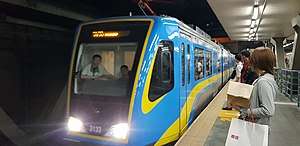MRTC Class 3100
The MRTC Class 3100 or CRRC Dalian 8MLB LRV, commonly called as Dalian Train, is a light rail vehicle built in China by CNR Dalian (later CRRC Dalian). Since its delivery, most of the trains are still being tested and undergoing final assessments, before being used on regular services on Line 3 of the Manila Metro Rail Transit System. [1]
| MRTC Class 3100 CRRC Dalian 8MLB LRV | |
|---|---|
 A 3100 Class (8MLB) train approaching Shaw Boulevard station | |
| In service | May 2016 October & December 2018 January 2019 October-December 2019 |
| Manufacturer | CNR Dalian (later CRRC Dalian) |
| Assembly | Dalian, China |
| Constructed | 2014–2015 |
| Entered service | June 1, 2020 (Regular service) |
| Number built | 48 vehicles |
| Number in service | 4 trainsets available for revenue service, having passed the 150-Hour Reliability, Availability, Maintainability, and Safety (RAMS) Validation Test in October and December 2018, then January 2019. |
| Formation | 3 cars per trainset (bi-articulated car body) |
| Design code | 8MLB |
| Fleet numbers | 3101–3148 |
| Capacity | 394 per car |
| Operator(s) | Department of Transportation (Philippines) |
| Depot(s) | North Avenue |
| Line(s) served | Line 3 |
| Specifications | |
| Car body construction | Stainless Steel |
| Train length | 99,000 mm (324 ft 10 in) |
| Car length | 33,000 mm (108 ft 3 in) |
| Width | 2,480 mm (8 ft 2 in) |
| Height | 3,724 mm (12 ft 2.6 in) |
| Doors | 5 double leaf, plug-sliding doors per side |
| Maximum speed | 80 km/h (50 mph) |
| Weight | 49,700 kg (109,600 lb) |
| Traction system | Voith IGBT-VVVF |
| Traction motors | TSA Three-phase induction motor TMR 36-28-4 |
| Power output | 120kW |
| Transmission | Quill drive |
| Acceleration | 1.3 m/s² (3.28 ft/s²) |
| Deceleration | 1.1 m/s² (service) 1.58 m/s² (emergency) |
| Power supply | 750V DC |
| Coupling system | Scharfenberg-type |
| Track gauge | 1,435 mm (4 ft 8 1⁄2 in) |
These trains are the first LRVs produced by CNR Dalian, which caused some controversy due to compatibility issues.
The CRRC Dalian 8MLB LRVs are owned by the Philippine government and operated by the Department of Transportation (DOTr).
Purchase
With the ridership of the Line 3 already peaking at almost half of its 350,000 original daily capacity, there have been calls to purchase additional trains as early as 2008. Initially, the government was looking at buying second-hand Spanish trains to immediately augment the problem: but after evaluation the order was cancelled for undisclosed reasons. In 2012, it was announced that the government intended to buy new trains for the line through public bidding. Companies from Europe, Japan, and South Korea were initially interested to participate at the bidding, but after the budget was published, decided to back out due to the low amount stipulated. The only bidder left was CNR Dalian (now CRRC Dalian) who controversially was awarded the contract.[2] The company delivered all 48 trains in 2016. Nevertheless, it was subject to scrutiny through numerous independent studies which are still being conducted as of February 2019.[3]
The targeted deadline for full operations of the train sets are set on July 2021, after the full rehabilitation of the entire MRT 3 train line. [4]
Design
Car body
The car body is made of stainless steel with a livery of sky blue and yellow fascia. Dimensions are nearly the same to the RT8D5M, which are also built for single-ended operations. It is connected by a Jacobs bogie and a gangway in each railcar section. It has a one-way eight-axle motorized car consisting of three articulations, which are connected to each other by the joint and the cover.
Interior
Each railcar is provided with five double leaf, electronically-operated, plug-sliding doors. The three center doors have an open width of 1,255 mm while the two end doors at 861 mm.
Traction equipments
The control device is an IGBT-VVVF inverter control manufactured by Voith, and six controllers are installed per trainset. The traction motor is a three-phase induction motor (totally-enclosed/self-ventilate type) manufactured by Traktionssysteme Austria[5] and is combined with Voith quill drive unit.
Operations
The trains run at a maximum speed of 65 kilometers per hour (40 mph) and run over standard gauge rail tracks.[6] The trains consists of 3 vehicles, with plans laid for operating with 4 vehicles each.
Each train can seat 80 passengers and carry, under rush loading conditions, 394 commuters at any one time.
See also
- Manila Metro Rail Transit System Line 3
- Metro Rail Transit Corporation
- MRTC Class 3000
References
- Talabong, Rambo (October 27, 2018). "After years of delay, DOTr begins adding Dalian trains to MRT3". Rappler. Retrieved February 18, 2019.
- Barrow, Keith (June 16, 2014). "CNR trains ordered for Manila Line 3". International Railway Journal. Retrieved February 18, 2019.
- Ignacio, Reicelene Joy (April 21, 2018). "CRRC DALIAN confident MRT-3 trains will pass audit". Manila Times. Retrieved February 18, 2019.
- Peralta, Janine (October 16, 2019). "All Dalian trains for MRT-3 line to be fully operational by July 2021 – MRT". CNN Philippines. Retrieved March 3, 2020.
- "TSA - Voith LRV for Manila MRT3". Traktionssysteme Austria. Retrieved February 23, 2019.
- "About". dotcmrt3.gov.ph. Retrieved March 22, 2019.